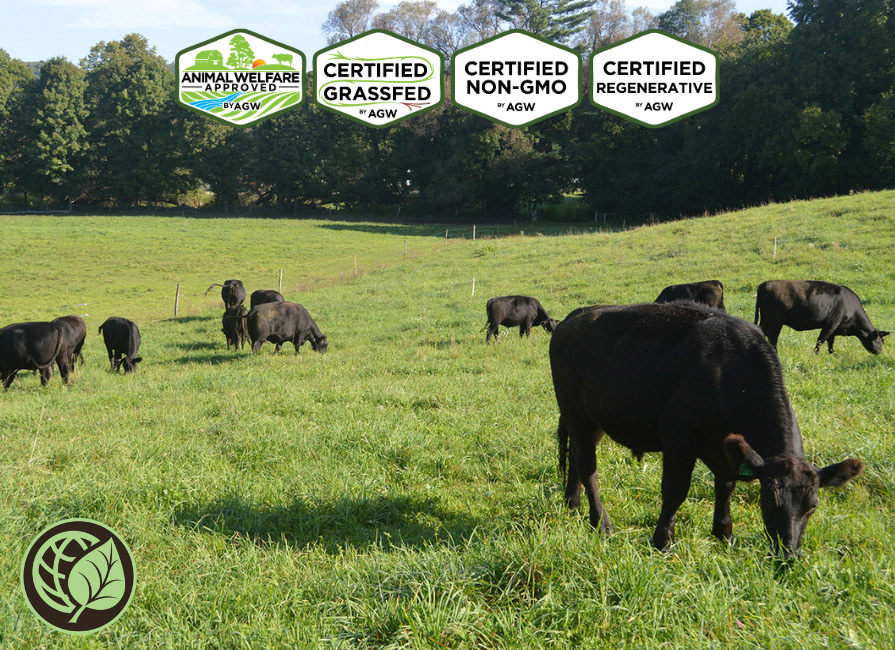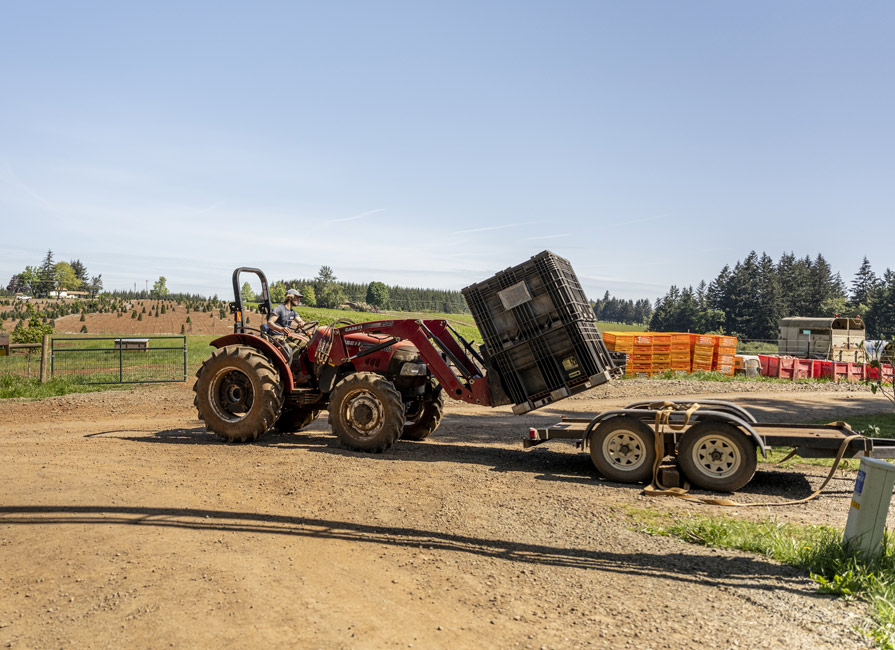One of the key attractions of our Certified Regenerative by AGW program is its practical…

Big Ag, Big Problems: Why Industrial Agriculture is Not the “Future of Food”
I read Michael Grunwald’s recent New York Times Opinion piece, Sorry, but This Is the Future of Food, with an equal measure of disappointment and irony.
Disappointment at Grunwald’s lack of journalistic rigor and ambition; irony because the author’s (pretty patronizing) presumption throughout that people are ‘out of touch’ and ‘uninformed’ about agriculture is arguably reflective of his own limited view.
I suspect that, like me, many readers will have seen through this uncritical attempt to dress up the further intensification and centralization of food production as our only option. If he’d broadened his sources, Grunwald would have learned that ‘business as usual’ agriculture will do nothing but worsen some of the most pressing environmental, animal welfare, and social problems we face. Instead, he echoes many of the tiredest talking points industrial agriculture has been selling for decades.
“Ideally, Big Ag could make even more food with even less land while doing less to harm the environment.”
Nowhere does Grunwald explain how this “ideal” is possible. It is not happening currently and I have yet to see a viable projection of how to achieve this. He seems to ignore the fact that soil, one of our most precious natural resources, is a perishable and finite commodity, and assumes that “business as usual” farming will continue to be possible in perpetuity. According to Earth.Org, every second an equivalent of four football fields of healthy soil becomes degraded. We need to regenerate our soils, not plunder them into oblivion. According to the United Nations Environment Program, “evidence suggests that the problem we face today is not a lack of food. Rather, it is a problem of efficiency.” And before anyone jumps to the conclusion that ‘efficiency’ means ‘intensification,’ the UN goes on to suggest that intensified farming has set into motion a vicious cycle, affecting both immediate and long-term food security: “Producing food that is both healthy and sustainable demands that we work with—not against—nature.” I couldn’t agree more.
“The key point, obscured by our cultural nostalgia for the quaint farmsteads of yesteryear, is that old-fashioned agriculture made much more of a mess when it replaced nature than intensive industrial agriculture makes when it replaces old-fashioned agriculture.”
Unless he’s advocating for extinction, I find it difficult to imagine a return to pre-agricultural planetary impact. Yes, by definition, all agriculture will have an impact on the environment and biodiversity. But the fact that agriculture is not “natural” should not absolve industrial systems of their significantly more damaging environmental impacts relative to modern agroecological agricultural practices.
I stress modern agroecological practices again. This isn’t about ‘going back in time,’ as Grunwald and others would like you to believe. Modern, regenerative farming is about applying highly scientific, systems-based approaches to food production that are tailored to mitigate any impacts as far is as possible, in conjunction with time-tested traditional practices that have sustained humans for millennia. Regenerative farms can be as hi-tech and dynamic as any other, while operating within the bounds of nature.
“The more grain their farms can grow for the world, the less new farmland will need to be wrestled away from Mother Nature on the other side of the planet. So we’re going to need to increase yields a lot.”
As the author later explains, a significant portion of grain produced goes to feed animals (largely raised in industrial confinement), not people. This argument (in addition to completely ignoring the problems of vast global food waste and access) assumes that because demand for cheap industrial meat exists, it must be filled by any means necessary. This is like saying, “well, we’re all addicted to opioids, so we need to find cheaper and more plentiful source, regardless of the consequences.”
“In general, beef from cattle that spend their last few months eating grain in feedlots is better for the environment than supposedly green, grass-fed beef from cattle that spend their entire lives in pastures — partly because grass-fed cattle take longer to reach slaughter weight, so they burp more methane and use more water, but mostly because grain-finished cattle use less land per pound of meat.”
The environmental impact of grain-fed vs. grass-fed beef is a complex topic and ultimately depends on how you define “better for the environment.” If you use methane as your only metric then grain-fed beef appears more efficient. But this argument ignores the natural efficiency of the cows’ ability to turn grass and other forages (substances that humans cannot digest) into meat, a land-use efficiency squandered by feedlot production. It also ignores the well-documented animal welfare, environmental and human health issues associated with industrial meat and poultry production. Yes, it can be difficult to measure carbon sequestration precisely. But it is an established natural process that happens in balance with nature and without the untenable side effects of industrial agriculture.
Of course, none of this is new. As we argued back in 2016, although pasture-raised cattle might have a slower growth rate and produce more methane per pound of meat, this is more than offset by the overall benefits of the entire pasture-based production system for biodiversity, animal welfare, and human health.
Grunwald’s vision is at best theoretical and, at worst, will simply worsen the widely recognized problems associated with industrial farming systems. Of note:
- CRISPR is the latest in a long line of genetic modification technologies that have promised much but shown little long-term benefit for sustainable food production and will inevitably have further unintended consequences, just as we have seen in other GMO technology.
- Land-sparing, where humans and nature are seen as separate entities and where farming and nature are entirely separated, is not feasible on a large scale. The thousands of farmers whom we work with prove each day that it is possible for farming and nature to coexist, and more environmentalists (and the United Nations) are now advocating an integrated, nature-based approach to farming and food production.
- Taxes on agricultural emissions will unfairly burden farmers while exempting those most responsible for our dangerous emissions, namely fossil fuel companies and others in the energy sector.
- Withholding aid for animal mistreatment would immediately dissolve into a quagmire of defining “mistreatment,” and is a very curious proposal from someone who is advocating for relatively low-welfare industrial confinement as the primary solution.
These ‘solutions’ omit the potential unintended socio-economic and environmental consequences of ‘business-as-usual’ agriculture while conveniently ignoring the proven agroecological solutions that are already being practiced by countless farmers around the world.
Finally, Grunwald fails to acknowledge other problems associated with our failing food system that demand urgent attention if we’re going to solve any problems in a meaningful way. We’re talking about vast food waste, environmental pollution, animal welfare, diet-related public health (including the potential loss of important antibiotics due to overuse in intensive livestock systems), and the massive subsidies that continue to incentivize the production of ultra-processed, highly palatable foods, to name but a few.
On two points, Grunwald and I would agree.
The first is that “Being big doesn’t make us evil.” This is true, although I would also contend that “Big” isn’t exclusive to industrial farming systems. I can point to many AGW-certified operations that are already producing sustainably at significant scale, supplying high-quality meat and other foods that don’t cost the world (literally). Indeed, we urgently need to scale up regenerative farming practices and redirect research and other financial support mechanisms to facilitate the transition to regenerative farming and make truly climate-smart practices mainstream. And we need to do it now.
Secondly, as a farmer-based organisation, we agree that it is not helpful to demonize farmers. After all, most farmers and ranchers are operating within parameters set by agribusiness and policy. But it is disingenuous to present ‘business as usual’ as the only viable option and to ignore the alternative solutions right in front of us.
Grunwald’s closing message sadly echoes Big Ag’s all too familiar directive: namely to “shut up and eat,” leaving us and our children to clean up the mess. I invite Grunwald to put his boots on and join me on a visit to an AGW-certified farm. He might just change his mind.


